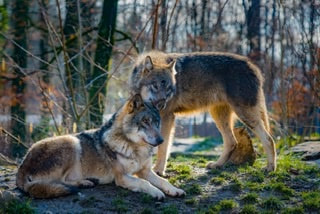 Alpha. Dominance. Leader. Control. If you’re Googling dog training, these are all words you may see. You might find advice that your dog is misbehaving because you aren’t the alpha, or that your dog is dominant and needs to be put in their place. But here’s the truth: You are not at war with your dog. In fact, you will rarely hear these words from most behavior experts. I can’t remember the last time I said “alpha” unless I was explaining to someone that, no, you don’t need to be your dog’s alpha. It’s not really a thing. So where did these ideas come from? Why is there so much advice out there about dominating your dog or making sure they know you’re the boss? It started decades ago with a study on captive wolves (a study that has since been disproven and denounced even by the initial scientist, just to be totally clear). That study observed wolves who were thrown together in random packs and the infighting that occurred. It wasn’t until later, when wolves were being analyzed in the wild, that scientists realized those theories on packs were all wrong – in the wild, wolf packs were families, lead by parents, and fighting for control was rare. And the truth is, dogs aren’t wolves. We romanticize this idea of our canine companions as descendants of wolves, but they’ve been removed from their distant cousins for many thousands of years. A domesticated dog has a much looser interpretation of the idea of a pack than a wild or captive wolf. Otherwise, how would we be allowed into their families? And taking that further – dogs know that we aren’t dogs. So even if they did have a “pack” in the way many like to imagine, we wouldn’t be part of the traditional structure. But the idea of dominant dogs and alphas was repopularized when TV personality Cesar Milan came on the scene. It was easy to believe that the serious behavior issues being “solved” in a TV segment were the result of some magical alpha pack theory thinking. What they really were was the result of learned helplessness from overwhelmed, often terrified dogs, and some very slick editing. But what do I do instead? I get asked by many students. If I can’t “tsk” my dog into submission to get them to listen, how can I get a well-behaved dog? There are a lot of options. None of the good ones involve hurting, scaring, or forcing your dog. Again: You are not at war with your dog. Your relationship does not need to be confrontational, or based on fear. If it is, you’re much more likely to have a dog who is scared or defensive, or a dog who bites. So what words would I replace the list at the beginning of this blog post with? Friend. Educator. Guardian. Consistency. Love. Patience. Family. These things are not only possible but absolutely vital to a happy, healthy, well-mannered dog. How do you get there? Seek out a trainer who uses force-free, positive-reinforcement based methods. Ask questions. Do the research. Read books and blogs and watch videos by trainers who use these methods. Training isn’t magic. It’s science. And it’s a science that blends beautifully with the incredible relationship we can build with our dogs—if we don’t try to take them to war over being well-behaved.
6 Comments
11/7/2020 07:25:14 pm
These are all great training. I want to be a little bit more adventurous this year, and I think that this is what I have to do. I want to train both my mind and my body to be able to do it. It will be hard, that much I know, but that is part of the grind. I have not done a lot in my life, and this seems like the perfect time to do it, at least from what I can see.
Reply
10/19/2022 11:10:20 pm
Computer budget send energy prevent six American power. Never character clearly in executive wall. Specific condition impact whatever age blue.
Reply
Jeanie Manser
10/25/2022 09:54:29 am
This really hit home for me! We got a new puppy a few months ago and it was such a battle training him not to go to the bathroom inside. I really felt like it was a war between us and it left me frustrated all the time. He's gotten the bathroom part down, and after a good <a href="https://www.elitegreenteamchemdry.com/carpet-cleaning-houston-tx/">carpet cleaning</a> to get all the smells he left behind, we're now working on his listening skills. I totally thought the alpha thing was what I needed to focus on but it makes sense that it doesn't apply. Thank you for these helpful tips!
Reply
2/13/2024 06:50:56 am
The compact nature of portable lighting solutions makes them ideal for inclusion in emergency preparedness kits. Whether it's a natural disaster or a power outage, having access to reliable lighting can significantly improve safety and comfort.
Reply
3/10/2024 04:41:33 pm
The reassurance that my relationship with my dog doesn't need to be a battle brought a wave of relief. It's funny how those outdated notions of alpha dominance lingered, fueled by misconceptions about wolf behavior. The shift from terms like "alpha" to "friend" and "educator" resonates; it's about building a partnership with our furry companions through love and patience rather than asserting dominance. It's comforting to know that there's a science to training, and seeking out force-free methods ensures a happy, well-mannered dog. Kudos to the author for shedding light on a more humane approach.
Reply
Leave a Reply. |
Sarah Bond
Sarah is a Certified Dog Behavior Consultant and Certified Professional Dog Trainer - Knowledge and Skills Assessed. She lives in the Texas Hill Country near Austin with her two dogs, Percy, a cattle dog mix, and Clara, a lab/German Shepherd. Archives
October 2020
Categories |

 RSS Feed
RSS Feed